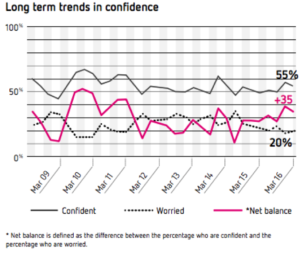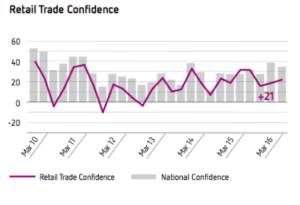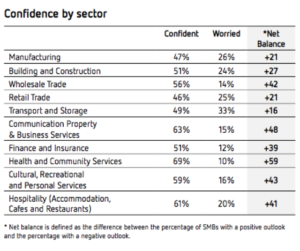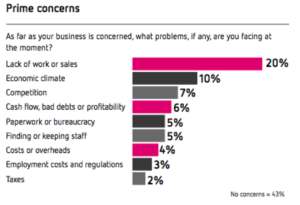[et_pb_section fb_built=”1″ _builder_version=”3.22″ global_colors_info=”{}”][et_pb_row _builder_version=”3.25″ background_size=”initial” background_position=”top_left” background_repeat=”repeat” global_colors_info=”{}”][et_pb_column type=”4_4″ _builder_version=”3.25″ custom_padding=”|||” global_colors_info=”{}” custom_padding__hover=”|||”][et_pb_text _builder_version=”4.11.3″ background_size=”initial” background_position=”top_left” background_repeat=”repeat” hover_enabled=”0″ global_colors_info=”{}” sticky_enabled=”0″]
The latest quarterly Sensis Business Index report has revealed the general level of small business confidence has dipped in Australia. However, the retail sector has started to show some positive signs of confidence in the economy.
Founder and managing director of online marketplace software company Marketplacer, Jason Wyatt, says measuring business confidence across sectors can be tricky, but Australian businesses are in a better state of mind than a few years ago.
He says the business owners he speaks to, especially in retail, are concentrating their efforts on getting strategy right in areas like omni-channel and online.
“We’re in touch with a lot of retailers through our marketplaces like Bike Exchange, TiniTrader, Outdoria and House of Home, and what we’re hearing is that customers are looking for less hassle in their online shopping journey,” says Wyatt.
“That’s a big thing for retailers now – getting the customer journey spot on. Retailers who connect effectively online with clients are driving leads and sales.”
The March 2016 quarter report – which is based on phone interviews conducted with 1000 small business owners or managers – found a mixed set of results across states as well as industries. Overall, business confidence was down by four points but remained relatively strong at net +35. This compares with +27 a year ago.

Source: Sensis Business Index report, March quarter 2016
Confidence in the retail sector, at +21 points, continues to trail behind the general confidence level of +35 points, but did rise by 2 points since last quarter.

Source: Sensis Business Index report, March quarter 2016
According to the report: “Being an established business and having an optimistic attitude are the main influences on confidence. Hard business conditions and weak sales are the key causes of pessimism.”
The retail sector recorded rises in confidence across four out of five criteria, with only wages showing a drop:
- Sales – last quarter (+7), this quarter (+20)
- Employment – last quarter (-3), this quarter (0)
- Prices – last quarter (+10), this quarter (+22)
- Profitability – last quarter (-11), this quarter (+22)
- Wages – last quarter (+19), this quarter (+7)
However, even though confidence in the retail sector perked up, it still remained the lowest among all other sectors in the survey.
The sector which recorded the highest level of confidence was health and community services (69% of businesses confident about business conditions), followed by the communication, property and business services sector (63%), and the hospitality sector (61%). The poorest performing sector was retail (46%).

Source: Sensis Business Index report, March quarter 2016
One of the most worrying trends identified in the latest survey is the concern businesses have about lack of work or sales, which continues to be the prime concern for SME owners and managers.

Source: Sensis Business Index report, March quarter 2016
While 43% of business owners cited no one specific major problem facing their business at the moment, 20% did say lack of work or sales was the biggest issue they faced. Lack of work or sales was also cited by 51% of employers as the reason they could not take on more staff.
[/et_pb_text][/et_pb_column][/et_pb_row][/et_pb_section]





